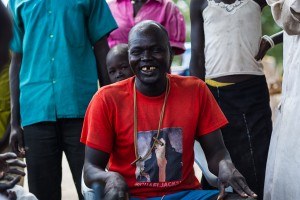Amer
Leaving is always difficult - and sometimes dangerous
When I visited the village of Amer last year I met an elder named Mehou. He had heard I was “in town” and was so grateful for the water well we drilled in his village that he waited for 3 days beside the borehole so he wouldn’t miss me.
When I arrived, Mehou showed me the blisters on his hands caused by his strenuous efforts to clean the area. He wanted to express a strong message of commitment and partnership to me.
As we sat under a tree together with his community to discuss their future, a sudden commotion interrupted us. Men ran for their spears. Another man, pedalling frantically on his bike, pulled up and went to whisper urgently in Mehou’s ear.
Mehou jumped to his feet and said, “Treana, I’m sorry, but this meeting is over. There has been a killing just behind us in the field and we must go quick.”
We abruptly said our goodbyes. The men ensured we were safely in our vehicle and evacuating the area before turning to run into potential battle.
This kind of conflict and crisis is unfortunately all too common in various areas of the world, and it’s a horrible feeling to drive away safely knowing what—and who—we are leaving behind.
We drove down the narrow road through the bush in silence. We couldn’t have stayed to help them and none of them would have left with us.
Villages like Amer are so remote that communication is nearly impossible. I never did hear what happened to the villagers that day, including Mehou. What I do know is that the people I spent hours with under the tree that day were ambitious, hard working and grateful, with big plans for their future.
Soon, I will visit again. I’m not even sure what or who remains within the village – but in a few days I’ll find out. Until then, I can only hope.

We had done all we could, but it didn’t feel like enough. — Treana Peake, Founder, Obakki Foundation